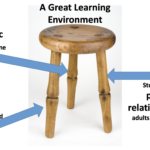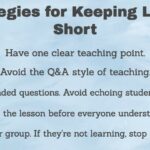Wouldn’t it be great if there was a perfect breakfast for teachers? We all know how important a good breakfast is. We know that when we eat a healthy breakfast with protein and fiber, we have good energy through the
You’ve got a student who is really struggling. Almost every day during math, he’s disrupting students nearby. You want to sit down with him for a problem-solving conference to figure out what’s going on. Maybe the two of you can
“What about kids who just don’t care?”
When I’m supporting teachers in schools, either around classroom management and discipline or academic engagement and motivation, this is a question that often comes up.
We all know these kids, don’t we? They
Classroom management and academic engagement are two of the most important aspects of getting off to a great start in the new school year. Though gem/marble jars, tickets, clip charts, and other incentive systems (including traditional grades) are common throughout
A Conversation Between Starr Sackstein and Mike Anderson
Starr Sackstein and I each often hear a worry from teachers we work with. They’re dedicated to the profession but are feeling exhausted, worn out, and stagnant. They aren’t sure what to
You may think of the first weeks of school as a time to focus on classroom management, and it is. But in fact, all year long, we should consider classroom management an active part of our daily teaching. How do
Kathy Collins and I were co-teaching a summer workshop for teachers on how to teach reading effectively. We were sharing about different kinds of direct instruction—various ways we can teach students the skills, strategies, and mindsets they need to be
A great learning environment is like a three-legged stool. Ruth Charney first introduced this concept to me years ago. It’s an important idea to keep in mind all year long, but it’s crucial during the first weeks of school.
The
I know many educators bemoan retakes. It is often seen as giving kids too many chances, not holding them accountable, and generally “lowering the bar.” I’ve heard the warning “There are no retakes in real life!” too many times to
What Are We Doing Today in Physical Education?
“What are we doing today?” is the most frequently asked question by my middle school students while entering the gym to get ready for class. After my response, students will usually either
A friend and colleague of mine, Andy Dousis, once told me that every lesson has three moments: a golden one, a silver one, and a leaden one. Whatever you say in the first 60 seconds of the lesson is the
Square pegs and round holes. This phrase plays over and over in my head each time I try to assign a letter grade to my students at the end of a marking period. My students’ learning is so complex, and
Walk through most schools, and you’ll see messages like the ones above, posted in classrooms and in hallways. We often encourage kids, as they’re about to work to “try your best” or “put in max effort.” One year in
Early in the school year, there’s a powerful proactive strategy we should all consider. Positive phone calls to families give you the chance to build connections and relationships with families that will yield benefits all year long. But is this
A few years ago my wife gave me three months of coaching for my birthday. I’d been running 5K road races and was trying some half-marathons. She thought I could use some professional help! We connected online, and I sent
This is probably a bit of a misleading title since there are plenty of overlaps between teaching SEL and character ed. If we put these two terms into a Venn diagram, we’d find plenty of overlaps. In my mind, there’s
In the final episode of Season I of Ted Lasso, players are somber and nervous heading into a do-or-die match against a superior team. Ted decides they all need to try something new, so he invites the players to name
As I’ve watched Ted Lasso, I can’t help but think about the lessons that we educators can learn along the way. Today we’ll consider a line from the very first episode: “Taking on a challenge is a lot like riding
My wife and I loved watching Ted Lasso. In fact, when our daughter came home from college for the holidays, we got her into it and watched both seasons again! One of the most powerful and uplifting scenes comes in
Even if you haven’t binge-watched Ted Lasso like I have (twice!), you’ve probably heard of it. In this blog post, we’ll explore one of Ted Lasso’s classic lines: Be a Goldfish and consider how it might help us when we’ve
A Brief History of Behaviorism, Part 5
If you could travel back in time about 60 years and walk through a typical school, you might be surprised to find something missing. You wouldn’t see behavior charts or “star student” award
A Brief History of Behaviorism, Part 4
If you could travel back in time about 60 years and walk through a typical school, you might be surprised to find something missing. You wouldn’t see behavior charts or “star student” award
A Brief History of Behaviorism, Part 3
If you could travel back in time about 60 years and walk through a typical school, you might be surprised to find something missing. You wouldn’t see behavior charts or “star student” award
A Brief History of Behaviorism, Part 2
If you could travel back in time about 60 years and walk through a typical school, you might be surprised to find something missing. You wouldn’t see behavior charts or “star student” award
A Brief History of Behaviorism, Part 1
If you could travel back in time about 60 years and walk through a typical school, you might be surprised to find something missing. You wouldn’t see behavior charts or “star student” award















